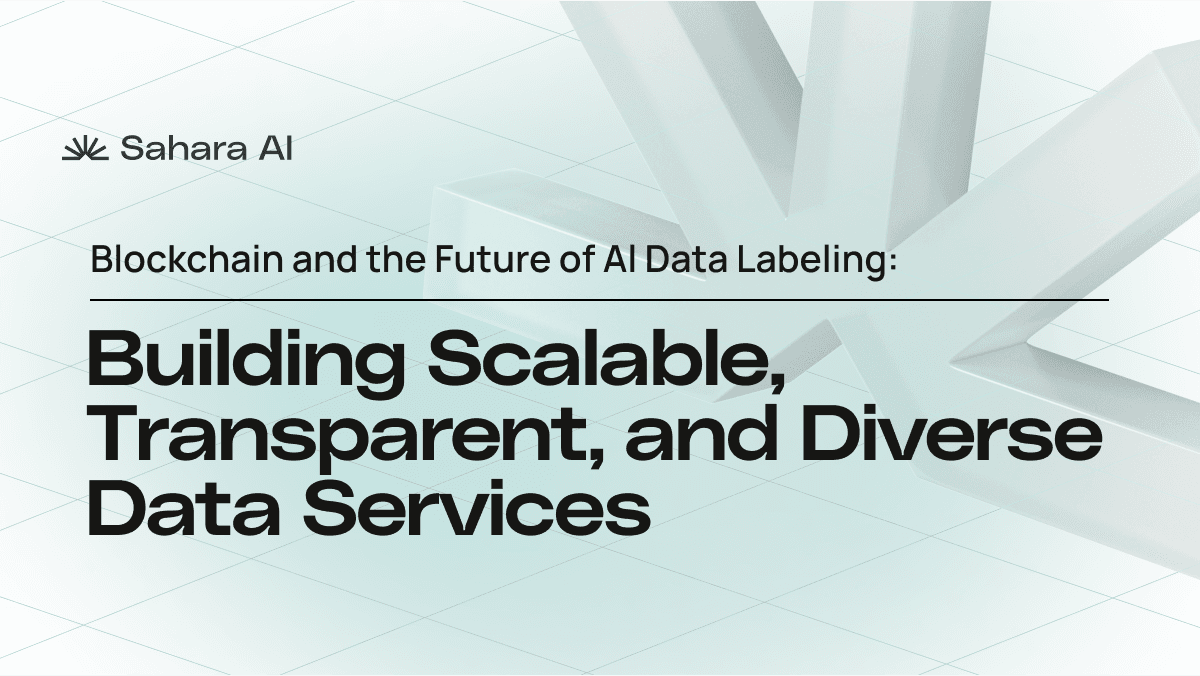Blockchain and the Future of AI Data Labeling: Building Scalable, Transparent, and Diverse Data Services
Dec 2, 2024
The rapid rise of Generative AI (GenAI) and Large Language Models (LLMs) has created an unprecedented demand for high-quality, labeled data. Yet, data labeling today is far more complex than it was five years ago. Simple tasks like tagging objects in images or classifying data as “dog” or “cat” have given way to more nuanced processes such as annotating sentiment, intent, or context, curating niche datasets, and verifying multi-modal data (e.g., aligning text with images). These tasks require significantly more thought, effort, and precision to complete. Many also demand subject-matter expertise to ensure accuracy, especially for highly technical or domain-specific datasets.
Blockchain technology is uniquely positioned to address the evolving needs of data labeling in AI. By decentralizing data collection and labeling, it enables diverse contributions from global participants, fostering inclusivity and better representation in data. Instant, programmable crypto payments eliminate traditional bottlenecks in compensating labelers, while blockchain’s immutable nature ensures transparency in workflows—all while preserving privacy.
However, as we transition data labeling processes on-chain, challenges around quality, verification, and scalability must be addressed. Tackling these hurdles thoughtfully is crucial to unlocking blockchain’s full potential as an enabler of diverse and scalable data labeling ecosystems.
Integrating Data Labeling with Blockchain
Moving data labeling processes on-chain introduces a new era of opportunities, but also a unique set of challenges. While blockchain enables global accessibility, transparency, and trust, but fully realizing these benefits requires addressing key issues such as maintaining data quality and trust while preserving privacy. By addressing these challenges, decentralization can unlock new levels of scalability and bring in a diverse global pool of labelers to enrich and support AI development.
Ensuring Data Quality
AI models require training datasets with extremely high quality—often exceeding 90%—to function effectively. On-chain workflows must integrate robust quality control measures to meet this standard. This could include:
Reputation Systems: On-chain reputation scores for labelers and reviewers ensure accountability and encourage consistent, high-quality contributions.
Majority Voting: Aggregating inputs from multiple labelers to identify consensus and reduce errors. Blockchain smart contracts can automate this process, ensuring transparency and immutability.
Honey Pots: Embedding pre-validated tasks within labeling workflows to identify low-quality or malicious labelers. Performance data from these tasks can feed into on-chain reputation systems, rewarding high performers and filtering out bad actors.
Layered Review Systems: Introducing multi-tiered validation processes where expert validators review critical datasets. These reviews can be incentivized through performance-based rewards.
Meeting Diverse Labeling Needs
AI projects often require labeling tasks that range from highly technical annotations to input from specific demographic groups. The diversity of these needs makes it difficult for any single labeler or team to handle every type of task effectively. Decentralization provides access to a broader pool of contributors, making it possible to meet these varied demands. However, decentralization also introduces challenges around maintaining trust, quality, and efficiency. Addressing these issues is critical to creating a decentralized ecosystem capable of meeting the diverse and growing needs of modern AI projects:
Specialized Expertise: Many AI projects require labelers with domain-specific knowledge, such as medical professionals for healthcare datasets or engineers for technical annotations. Verifying that contributors possess the necessary expertise in a decentralized system can be challenging. Reputation systems offer a solution by allowing domain experts to build credibility in their specialized areas, making it easier to identify and assign them to relevant tasks. This approach ensures expertise is verified without relying on centralized authorities, while maintaining scalability and privacy.
Demographic Representation: Certain datasets require authentic input from specific demographic groups, such as young parents or residents of a particular region. Ensuring labelers genuinely represent these demographics in a decentralized system is difficult, as there are fewer direct ways to verify such attributes. Addressing this challenge involves developing trust frameworks that balance representation with privacy.
Instant, Cross-Border Payments
Traditional payment systems are slow, expensive, and often inaccessible to labelers in certain regions. These barriers can discourage participation, particularly for labelers in underserved areas, where transaction fees, currency conversion costs, and limited banking infrastructure make it challenging to receive fair and timely compensation. Blockchain-based crypto payments address these issues and offer significant advantages:
Instant, Low-Cost Transactions: Crypto payments enable labelers to receive funds quickly and affordably, eliminating delays and high fees associated with traditional payment systems. For many labelers who depend on these earnings as part of the gig economy, timely payments are important for managing daily expenses and financial obligations.
Global Accessibility: Unlike traditional payment methods that often exclude individuals without access to formal banking systems, crypto payments are universally accessible to anyone with an internet connection. This opens opportunities for a more diverse global workforce, allowing labelers from all backgrounds to participate in AI data-labeling projects.
Addressing Black-Box Pricing
In traditional AI services, managed data-labeling platforms can often charge a 100-200% premium for their services, leveraging opaque pricing structures that limit access to high-quality datasets for developers. Many small or emerging AI projects struggle to afford these services, limiting innovation and competition in the ecosystem. And these high premiums often don’t translate to better compensation for labelers, who may still face underpayment despite high service costs.
Decentralization addresses these issues by replacing opaque intermediaries with transparent, on-chain systems that allow AI developers and labelers to interact directly:
Transparent Pricing: Blockchain makes pricing visible and traceable, eliminating hidden costs and ensuring fair compensation for labelers.
Efficient Operations: Smart contracts automate many processes, reducing overhead and enabling lower-cost services.
Fair Revenue Distribution: By decentralizing data labeling, more value can be passed directly to labelers, incentivizing quality and fostering long-term participation.
Revolutionizing AI Development
Blockchain is transforming how data labeling supports the AI ecosystem by democratizing participation and enabling global collaboration. When combined with well-designed systems, decentralization provides a foundation for reshaping how data is collected, labeled, and used in AI development.
Over the past two years, Sahara AI has partnered with enterprise clients like Microsoft, Amazon, Snapchat, and Motherson to refine data-labeling workflows and meet the demanding requirements of Generative AI (GenAI) and large language models (LLMs). Leveraging these insights, we have access to a global network of 300,000 labelers across 35+ countries, fluent in 45+ languages and dialects. With this expertise and infrastructure, we are now bringing these capabilities on-chain, empowering contributors worldwide to participate in data labeling while earning fair rewards.
By applying proven methodologies to a decentralized framework, Sahara AI is bridging the gap between AI model developers and global data contributors. Our proprietary auto-labeling models that match human performance on mainstream tasks, accelerate the labeling process. Human-in-the-loop workflows validate and refine these results, ensuring high accuracy where automation alone falls short. This iterative feedback loop allows models to continuously learn from human input, improving labeling quality and efficiency over time.
With Sahara Data Services, AI model and app developers can:
Seamlessly curate and refine datasets, improving the quality of their models.
Outsource complex or high-volume collection and labeling tasks to specialized teams or community members.
Monitor and manage quality through automated and human-in-the-loop validation processes.
Data collected and labeled through Sahara Data Services can also be listed in our Data Marketplace, offering even more developers access to the diverse and enriched data they need to train, fine-tune, and deploy cutting-edge AI.
Join the Future of AI Data Labeling
By integrating these data capabilities into one unified platform, Sahara AI enables developers to focus on innovation while streamlining the operational complexities of data preparation. At the same time, it creates new opportunities for labelers by offering access to fair, transparent, and flexible work, where they are rewarded for their efforts in a decentralized ecosystem.
Sign up for early access to the Sahara Data Services platform today




